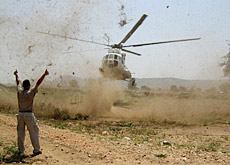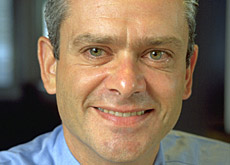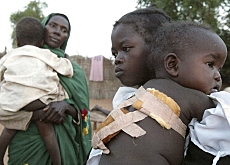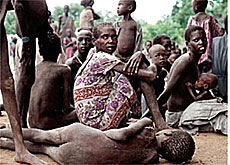Swiss strive for peace in Sudan

An international mission to supervise a Swiss-brokered ceasefire agreement in Sudan’s Nuba Mountains came to an end on Monday.
The United Nations is to take over responsibility for keeping the peace between the government and rebels in the south of the country with Switzerland’s support.
The ceasefire agreement was signed at the luxury Bürgenstock resort above Lake Lucerne in January 2002. Since then Switzerland has played a key role in keeping both sides at the negotiating table.
Senior Swiss diplomat Josef Bucher told swissinfo that maintaining the ceasefire in the Nuba Mountains had laid the foundations for a definitive peace accord between Sudan’s government and the Sudan People’s Liberation Army.
This was signed in Kenya in January this year and is aimed at ending 21 years of civil war. The conflict is estimated to have resulted in more than two million deaths, primarily from war-induced famine and disease.
“The Nuba Mountains agreement paved the way for the political negotiation that started in Kenya in June 2002,” said Bucher.
However, the deal does not cover the separate conflict in the western region of Darfur, where government-backed militia are accused of killing thousands.
Monitoring the ceasefire
One of the outcomes of the Bürgenstock agreement was the creation of the Joint Military Commission (JMC), which brought together both conflict parties and international observers to supervise the ceasefire.
Switzerland funded the JMC throughout its three-and-a-half-year mission to the tune of SFr2.5 million ($2 million).
The Swiss also supplied 15 specialists from the country’s expert pool for civil peace promotion at a cost of a further SFr2.5 million. Swiss experts contributed in the areas of federalism and the division of oil revenue.
Around SFr200,000 of this sum was used to produce maps based on satellite pictures of the Nuba Mountains to assist the JMC, humanitarian agencies and the civil administration.
“The reason that the ceasefire was so successful is that both parties respected it and both parties had political reasons to respect it that lay outside the Nuba Mountains,” said Bucher.
“Both of them were engaged in negotiations in Kenya for the whole of Sudan, and for both parties it was not worth causing big problems in the Nuba Mountains. They would have had to pay the consequences in the comprehensive political negotiations.”
No confrontation
Bucher said there had been no military confrontations in the Nuba Mountains during the JMC’s lifespan.
This had enabled the JMC not only to carry out its mission of counting weapons and troops, but also to organise local peace conferences between divided communities.
Lisa Ibscher, a member of the pool of experts, said that stability in the region had led to around a third of the one million people displaced from the region returning to their homes.
Responsibility for maintaining the ceasefire and January’s peace agreement will now fall to the 10,000-strong UN Mission in Sudan.
Colonel Jacques Baud, who is responsible for peacekeeping operations at the Swiss foreign ministry, is leading the team charged with ensuring security for the UN peacekeeping force.
swissinfo
Switzerland is to contribute more than SFr10 million a year to the United Nations Mission in Sudan from 2006.
The government has also allocated $75 million over the next three years in humanitarian aid.
Since its inception in January 2002, the JMC was funded by Switzerland to monitor the Bürgenstock ceasefire agreement.
The Swiss have also provided 15 specialists from the expert pool for civil peace promotion.
Monitoring of the ceasefire in the Nuba Mountains between the Sudanese government and the Sudan People’s Liberation Army has now been handed over to the United Nations.

In compliance with the JTI standards
More: SWI swissinfo.ch certified by the Journalism Trust Initiative



You can find an overview of ongoing debates with our journalists here. Please join us!
If you want to start a conversation about a topic raised in this article or want to report factual errors, email us at english@swissinfo.ch.